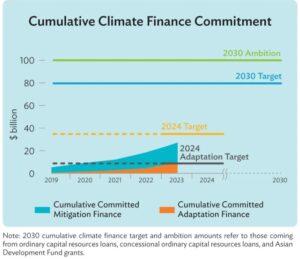
Climate change: The re-election of Donald Trump as President of the United States introduces significant uncertainties into the global climate action framework. Trump’s scepticism toward environmental policies, and commitment to expanding fossil fuel industries threaten to reverse progress made under the Biden administration. This shift occurs amidst pivotal international efforts, notably the recent G20 Summit in Rio de Janeiro, where leaders emphasised the necessity of substantial financial support for developing nations to combat climate change.
During the G20 summit, President Biden announced initiatives including a $4 billion funds over the next three years to the World Bank’s International Development Association. This includes contributions to the World Bank for financing clean energy projects, highlighting the critical need for global cooperation. Trump’s return has cast a shadow over negotiations at the COP29 conference in Baku also, raising concerns about the United States’ future engagement in international climate commitments.
READ | G20 Brazil: A summit of promises, pitfalls, and pressing realities
Impact on global climate finance
One of the vital pillars of international climate agreements is financial assistance to developing nations, enabling them to transition to low-carbon economies and build resilience against climate impacts. Under Biden’s leadership, the US pledged billions of dollars towards climate adaptation and mitigation efforts in vulnerable regions. Trump’s administration is expected to deprioritise and potentially abandon these commitments, reducing the availability of essential funds.
This shift undermines climate equity, forcing poorer nations to bear the consequences of emissions primarily driven by developed economies. Trump’s return may also deter private investment in green infrastructure, with ramifications for technology transfer, renewable energy adoption, and emission reductions globally.

The cutback in climate financing diminishes the prospects for net-zero transitions in developing nations, pushing them to rely on more accessible fossil fuel options. These concerns are particularly pressing in light of the recent G20 Summit, where leaders emphasised the necessity of substantial financial support for developing nations to combat climate change.
Domestic fossil fuel expansion
Domestically, Trump is expected to double down on fossil fuel expansion, rallying for more oil and gas drilling, offshore lease sales, and fracking on federal lands. This “drill, baby, drill” philosophy might win support from traditional energy sectors but could hinder the United States’ ability to meet its own emission reduction targets, much less contribute to global goals.
Moreover, new restrictions on clean energy imports, such as tariffs on Chinese-made solar panels, could disrupt the renewable energy market in the US, limiting affordable clean energy options. Ironically, the Inflation Reduction Act, a Biden-era landmark law intended to invest in green technology, could become a political battleground.
With roughly 80% of IRA funds allocated to Republican districts, even conservative lawmakers may resist efforts to dismantle the law entirely, given its job creation benefits. These pockets of green growth, along with state-level climate initiatives, may buffer against Trump’s federal rollback of environmental regulations. The international community, as reflected in the recent COP29 agreements, continues to advance clean energy initiatives, underscoring the importance of sustained commitment despite federal policy shifts.
Fragmented climate leadership in the US
As the federal government recedes from climate leadership, states like California, New York, and Washington are likely to strengthen their climate initiatives, further decentralising climate action in the US states with active clean energy policies, such as Washington’s new cap on fossil fuel emissions and California’s climate bond program, will push ahead with policies that limit emissions and promote renewables. This shift could create a patchwork of climate policies across the US, with progressive states leading decarbonisation efforts, while federal policies enable fossil fuel expansion elsewhere.
This fragmentation is far from ideal. Although state and local initiatives can create regional emissions reductions, they lack the scope and funding necessary for sweeping national changes. In the long run, even well-intentioned local policies cannot fully substitute for coordinated federal action, which is essential for meeting ambitious climate goals. The recent G20 Summit highlighted the necessity of cohesive national and international strategies to effectively combat climate change.
Renewables and global cooperation
Despite the challenges posed by the new administration, the momentum toward clean energy and climate resilience persists. Developments at COP29, such as the agreement on international carbon market standards under Article 6 of the Paris Agreement, represent significant strides in global climate governance. Additionally, the G20’s recent endorsement of recommendations to unlock climate funds and commitment to monitor their implementation reflect a concerted effort to address climate financing challenges.
While federal policies may shift, state-level initiatives and international collaborations remain crucial in sustaining and advancing climate action. The resilience of these efforts will be instrumental in navigating the complexities introduced by the current US administration’s stance on climate change.
Trump’s return to the White House poses serious risks to global climate progress, with his administration’s policies likely to reverse key environmental initiatives and undermine international commitments. Yet, the progress made at COP29 and the G20 Summit demonstrates that global momentum toward climate resilience remains strong.
The transformation of the energy sector and the determination of key players worldwide offer a foundation to resist the worst outcomes. As the international community adapts to this new reality, the ability of states, businesses, and global coalitions to sustain and amplify climate action will be critical in keeping the planet on track for a sustainable future.
